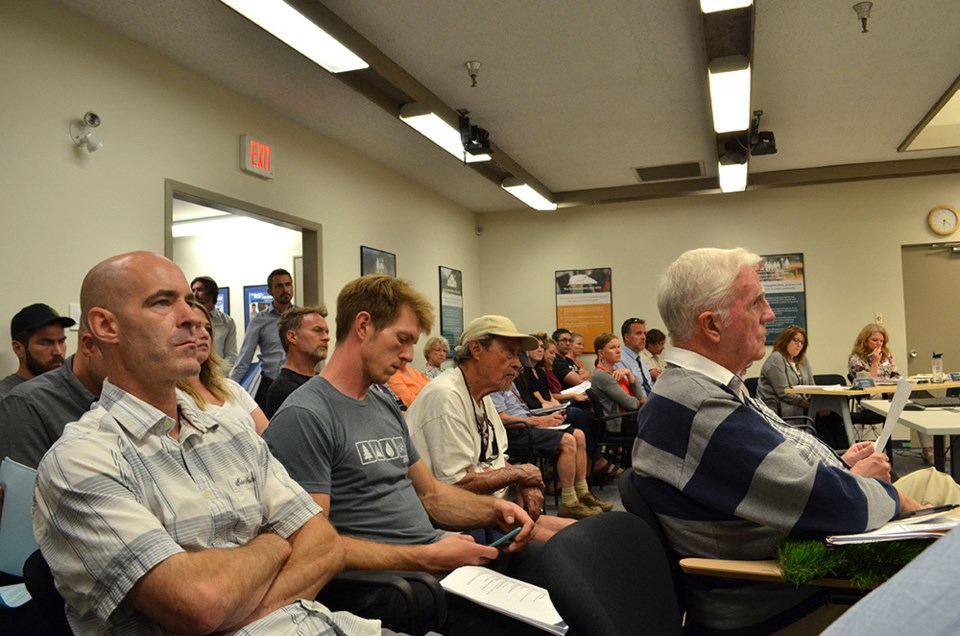Despite widespread apprehension from local entrepreneurs, Squamish council went ahead with measures that are intended to temporarily curb commercial expansion in the business park.
Bylaw No. 2663 2019 would eliminate the ability for new commercial-type businesses, such as restaurants or gyms to set up shop in the business park. It would also formally ban cannabis production in the Rail Marshalling Yard.
Existing businesses fitting those descriptions are allowed to stay, but no new commercial enterprises would be allowed.
This regulation is intended as a stopgap measure to preserve industrial space, which District staff say is necessary to prevent trade-type businesses — such as auto repair shops — from being priced out of land originally intended for them.
Commercial businesses drive up rent and require regulations that prove costly for others inhabiting the same space as them, staff say.
At a public hearing on June 18, the vast majority who spoke warned of unforeseen consequences and expressed worry that the proposed bylaw would stifle businesses’ ability to grow and expand. Virtually all who spoke either owned or were associated with a business or an organization.
Just about every public seat in council chambers was taken, and some people opted to stand in the hallway.

However, after the hearing, council unanimously voted in favour of passing third reading on the bylaw, thereby virtually guaranteeing that the measure will be adopted.
“I am a little bit nervous about putting this stopgap measure in place because of the growth issues mentioned by folks,” said Mayor Karen Elliott.
“But I know that there are people that weren’t here tonight that feel quite strongly about protecting more industrial land until we have a strategy laid out.”
Councillors emphasized that the measure would only be a temporary one, and that a more permanent solution would be created after further consultation on the zoning bylaw overhaul intended to happen by next year.
However, prior to council’s decision, those who spoke at the hearing regarded the bylaw warily. “We do want to express the need for caution around measures that may prevent the growth of existing businesses, particularly those who service both locals and visitors alike,” said Kirby Brown, speaking on behalf of Tourism Squamish.
“Some businesses need larger spaces than are currently available in the downtown BIA and lack viable options to continue to grow.”
There were also some voices in the crowd who feared some of the measures clamping down on cannabis production in the railyard. They said it would hurt local cultivators and affect local retailers.
“My dream is to have 100 percent of product in the store be made in Squamish,” said Bryan Raiser of 99 North cannabis dispensary.
“But you can’t have stores everywhere and have nobody in town to provide the goods to those stores.”
As the railyard area is considered too close to residential areas, no new cannabis production would be allowed regardless — the bylaw simply seeks to make that clear, staff said.

A number of craft brewers, as well as the association representing them, came out to voice why they were concerned about the bylaw.
Kelly Woods, president of the Squamish Craft Beverage Association, said her business could be stifled as a result of the new bylaw.
Woods, who co-owns Gillespie’s Fine Spirits, noted that investors are interested in helping her expand the establishment, including its food operations, which appear to be targeted by the new rules.
“So, if you want Gillespie’s to still exist, it’s something we need to talk about,” said Woods.
She also said she hoped the cannabis ban in the area would not apply to the processing of the product, as Gillespie’s is considering incorporating marijuana into some of its beverages.
“We would like to work with the city and council to come up with other options, but at this point, we are against the bylaw,” said Marc Roberts of Backcountry Brewing.
He echoed concerns that the bylaw would hinder the expansion and growth of businesses, which would ultimately have a negative effect.
Rajan Hans, speaking for the Squamish Chamber of Commerce, said had similar words.
“Feedback from members is largely supportive of preserving land for industrial uses, but there is caution around measures that may prevent growth on existing businesses,” Hans said.
There was one person, however, who did express concerns about what would happen if a freeze on commercial expansion did not take place.
“It’s very hard for a motorcycle shop, or a mechanic shop, or a tire shop, or a fabricating shop.... there’s nowhere for them to go. It’s not affordable,” said Noel Koehn, who identified himself as the owner of six properties on Queens Way.
“As a landowner, it’s great because the lease rates are quite high compared to what they used to be, but as a tradesperson it’s bleak.”
Koehn, who also owns Newport Auto Inc., offered the suggestion of allowing restaurants to operate only if they have a manufacturing component, such as a brewery.
The bylaw also included a measure allowing for building heights in some areas in the business park to increase to 15 metres, up from 10.68 metres. This change is intended to offset space lost from flood construction levels, which eat into structures’ allotted height.
However, a stipulation allowing for principal building heights to increase to 25 metres in the railyard was discarded, due to a need for further consultation with the Squamish Nation.



